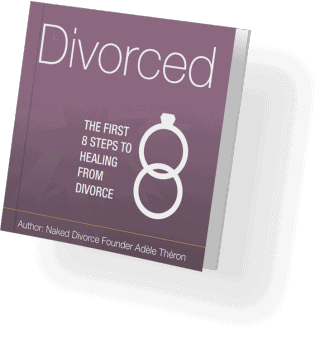
Free e-book: The First 8 Steps to healing from divorce
Healthy and Unhealthy Coping Mechanisms After Divorce: Healthy Strategies for Resilience

One of life’s most difficult and emotionally volatile events might be going through a divorce. You could feel disoriented and overpowered because it frequently feels like a whirlwind of feelings. However, there is a bright spot in the chaos: the chance to find yourself and come out stronger than before. This article will explore the power of healthy Coping Mechanisms After Divorce as we delve deeply into the world of post-divorce life. We’ll walk you through techniques that not only help you deal with the emotional difficulties, but also open the door to real personal development. It’s time to start your healing process while embracing a better future and utilizing your resilience.
Understanding the Trauma of Divorce:
The Emotional Impact of Divorce
Divorce is a significant and, occasionally, terrible process; it goes beyond simply ending a relationship. It may cause an identity crisis as we consider what we could have done better, all while feeling ashamed and guilty. When we go from being a pair to being single people once more, this instability is sometimes accompanied by a significant change in self-identity. It’s important to understand that these feelings are natural and essential to the healing process. Finding good coping techniques begins with acknowledging them.
The Role of Coping Mechanisms
Coping strategies enter the picture as our instruments for survival amid the emotional turmoil. These procedures aid us in navigating the choppy waters of divorce. It’s crucial to distinguish between treatments that actually promote healing and those that merely offer transient respite. Your allies on this trip will be healthy coping mechanisms, which will help you process your feelings and ultimately come out stronger. Maladaptive coping strategies, on the other hand, might keep you in a loop of avoidance and keep you from confronting the sources of your suffering, even though they temporarily provide relief.
Unhealthy Coping Mechanisms:
The Pitfalls of Survival Mechanisms
After a divorce, it’s normal for people to turn to what are known as survival strategies for comfort. While appearing to offer a momentary sense of relaxation, these mechanisms frequently have more serious and lasting effects. While they provide some relief from the pain, they do little to address its underlying causes. They frequently appear as anxious or depressive forms of emotional avoidance. To prevent falling victim to these traps, it is essential to be aware of them.
Excessive Shopping: Overspending on purchases is a typical maladaptive coping mechanism. The act of purchasing material goods may temporarily divert attention from emotional distress, but it can quickly lead to financial problems, which will only make your stress and anxiety worse. A new purchase only provides momentary happiness, which can start a vicious cycle of compulsive spending.
Workaholism: Overworking oneself is another coping mechanism. While immersing oneself in a work may appear beneficial, it frequently serves as a way to block out unpleasant emotions. Burnout, strained relationships, and a lack of fulfilment in other areas of life can result from the continuous pursuit of professional achievement.
Substance Abuse: Some people use alcohol or drugs or other substances to dull their feelings of pain. Although these drugs could offer a momentary escape, they can also cause addiction, physical health issues, and worsening mental health. Abuse of substances can impede healing and personal development.
Endless Entertainment: It may seem like a harmless diversion to spend hours playing video games or binge-watching TV series. Problematic situations arise when it is used as a main strategy for avoiding something. These behaviours can result in loneliness, carelessness with obligations, and a sustained separation from your own feelings.
The Danger of Numbing Emotions
The fact that these unhealthy coping techniques dull our emotions may be their greatest threat. Although it could appear like a relief from the discomfort, it’s like applying a band-aid to a wound that is already infected. Our wants are being met or disregarded, as shown by our emotions, which act as important signals. We lose out on the important lessons that these emotions might impart when we numb ourselves.
Anger, on the other hand, can indicate boundaries that have been crossed, while grief can suggest unfulfilled desires for connection and support. We deprive ourselves of the chance to confront the underlying reasons of our suffering and gain wisdom from our experiences when we numb these feelings. We continue to be caught in a cycle of momentary respite followed by protracted agony rather than finding healing.
It’s important to realise that accepting your feelings, rather than repressing them, is a necessary part of healing following a divorce. In the sections that follow, we’ll look at better coping skills that let you work through your emotions, discover personal growth, and finally open the door to resilience and a better future.
Healthy Coping Mechanisms
Embracing Growth Resources
Divorce may be a seismic event that shakes your life’s basic basis. However, despite the emotional turbulence, you can use strong techniques and tactics to not only survive but also flourish in the aftermath. Healthy coping strategies enable you to embark on a journey of personal development and resilience-building rather than simply numbing the pain.
- Self-Care: Nourishing Your Well-being
Self-care is one of the cornerstones of healthy coping. Setting your physical, emotional, and mental health as a top priority will help. Take good care of your body first. Make certain you’re eating wholesome food, getting adequate rest, and leading a balanced lifestyle. These ostensibly straightforward actions can have a significant impact on your capacity to handle the emotional hardships of divorce. When your body is properly fueled, it gives you the mental and emotional fortitude required to deal with your emotions.
- Connection: Strengthening Your Support Network
Feelings of loneliness and isolation can frequently follow divorce. Reaching out to and maintaining connections with friends and family is crucial, though. Having deep interactions with your loved ones might give you a sense of community and support. Talking about your experiences with people you trust may be immensely therapeutic, so share your ideas and feelings with them. Building and sustaining your support system gives you access to a variety of viewpoints and coping mechanisms, which not only makes you feel less alone.
- Mindfulness: Staying Present and Processing Emotions
Being present in the moment and connecting with your emotions are both made possible by the potent practise of mindfulness. It entails tuning into your senses, recognising and accepting your thoughts and sensations without passing judgement on them. Processing the complex emotions that come with divorce can be aided greatly by mindfulness. It enables you to examine your emotions, comprehend their causes, and progressively overcome them. You’ll improve your emotional intelligence and resilience via mindfulness practise, two qualities that are priceless during this trying time.
Building Resilience
Effectively negotiating the difficulties of divorce depends on resilience. It’s not about masking your feelings or acting like everything is alright; rather, it’s about having the resilience to overcome difficulties. Healthy coping strategies encourage you to face your feelings and learn from them rather than undermining your needs or covering up your suffering. While it may be tempting to indulge in bad behaviours to numb your pain, adopting growth-promoting activities can help you achieve lasting healing. You’ll find your inner strength and the ability to not only survive but thrive after divorce by embracing personal growth and resilience-building tactics.
Conclusion
Although divorce is obviously difficult, it doesn’t have to determine your future. You can start your path to recovery and self-discovery by distinguishing between unhealthy coping mechanisms and growth-oriented coping mechanisms. You’ll be on the road to resilience and personal development if you embrace the power of effective coping strategies.
At Naked Divorce, we have Recovery Programs and Retreats that have been created around helping you navigate the divorce grief life cycle in a healthy way.
Get in touch with Naked Divorce if you need support on your divorce journey.
If you enjoyed this post, I’d be very grateful if you’d help it spread by emailing it to a friend, or sharing it on Twitter or Facebook.
With you in service,


For a more personalized approach to your healing journey, book a free Clarity Call now. Our coaches are here to help you take your first steps towards healing. Check out our Resources or our Videos on YouTube.

